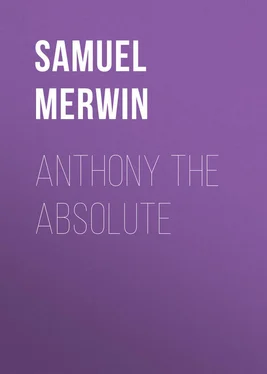Samuel Merwin - Anthony The Absolute
Здесь есть возможность читать онлайн «Samuel Merwin - Anthony The Absolute» — ознакомительный отрывок электронной книги совершенно бесплатно, а после прочтения отрывка купить полную версию. В некоторых случаях можно слушать аудио, скачать через торрент в формате fb2 и присутствует краткое содержание. ISBN: , Жанр: foreign_prose, на английском языке. Описание произведения, (предисловие) а так же отзывы посетителей доступны на портале библиотеки ЛибКат.
- Название:Anthony The Absolute
- Автор:
- Жанр:
- Год:неизвестен
- ISBN:http://www.gutenberg.org/ebooks/52507
- Рейтинг книги:5 / 5. Голосов: 1
-
Избранное:Добавить в избранное
- Отзывы:
-
Ваша оценка:
- 100
- 1
- 2
- 3
- 4
- 5
Anthony The Absolute: краткое содержание, описание и аннотация
Предлагаем к чтению аннотацию, описание, краткое содержание или предисловие (зависит от того, что написал сам автор книги «Anthony The Absolute»). Если вы не нашли необходимую информацию о книге — напишите в комментариях, мы постараемся отыскать её.
Anthony The Absolute — читать онлайн ознакомительный отрывок
Ниже представлен текст книги, разбитый по страницам. Система сохранения места последней прочитанной страницы, позволяет с удобством читать онлайн бесплатно книгу «Anthony The Absolute», без необходимости каждый раз заново искать на чём Вы остановились. Поставьте закладку, и сможете в любой момент перейти на страницу, на которой закончили чтение.
Интервал:
Закладка:
“I am glad of that,” said I, “because I believe that, with the drink out of your system, your philosophy of life will change. I hope it will.”
He shook his head at this.
“No, Eckhart. Now, see here. You have today seen deep into a man’s heart. What you saw was not drink, merely; it was fact.”
His manner of saying this gave me an uncomfortable feeling that he was speaking the truth. Indeed, my increasing conviction as to the great reserve power of the man was distressing me.
“As I told you this morning,” he went on, “there is absolutely nothing you can do in the matter. Except killing me, of course – you could do that. But you won’t.”
“No,” said I sadly; “I won’t.”
“And I’m going to ask you to take the only course that an honorable man can take in the private quarrel of another – stand aside and try to forget what I have told you. You have my drunken confidences; forget them.”
“See here!” I broke out. “Were you faithful to your wife before she turned against you?” His eyes hardened. “What do you mean by that?” he asked.
“Precisely what I say.”
“You’re talking nonsense, Eckhart – ”
“I am not talking non – ”
“Yes, you are! ”
He had swung around, and was sitting up, looking me squarely in the eye, as he shouted me down. My heart sank. Mere squabbling would get us nowhere. I did not know what to do. I do not now know what to do.
He went on:
“Yes; I was, to all intents and purposes, faithful to her. I did as well as a normal, healthy man can be expected to do. Let us not be childish about this. You and I know that man is physiologically different from woman. We know that what there is of purity and sacredness in marriage and in life will be lost forever once we lower our ideal of woman’s virtue.”
“No,” said I; “as a scientific man – ”
I could not go on with my protest; for thoughts of a few wild moments in my own relatively quiet life had come floating to the surface of memory. Who was I, to oppose the double standard of morality that has ruled the world so long!
He was still looking at me in that intent way. There was deep sadness behind the hard surface of his eyes.
“I came here to thank you for all your kindness, Eckhart,” he said then. “As for what you have heard, remember it is mine, not yours. That is all. Now, if you don’t mind, I’ll help you get your truck down to the train.”
I did as he said. I am on my way to Peking to pursue my research. He is plunging off to scour the ports of Japan, all the way to Nagasaki, for the man and the woman who have assailed his honor and (what I am tempted to think even more to the point) outraged his pride as the head of his own house. Then he will go on, if necessary, to Shanghai, – that port of all the world, – to Hongkong, Manila, and Singapore, perhaps up the coast to Tientsin and Peking. And he has made me believe that he will do as he has sworn. It is very strange – very sad.
At the station I made my last weak protest.
“Crocker,” I blurted out, “for God’s sake, try to win her back. Perhaps you drove her away. Perhaps you were harsher, less understanding, than you knew. Perhaps you should beg her forgiveness, not she yours.”
He shook his head. “That may be so,” he said. “All that you say may be so. But I could n’t take her back. Don’t you see?”
“No,” I replied stoutly, “I don’t see.”
He raised both his hands in a despairing gesture.
“She is – she – ” His voice suddenly failed him. “She’s a woman – and she’s soiled!” His eyes filled; a tear rolled down his cheek. He made a queer, convulsive face; then threw up his hands and turned away.
That was all. I boarded my train.
The young German did not return the fifteen dollars. This China Coast is a hive of swindlers – so says Sir Robert. Henceforth I intend hardening my heart against every man. And against every woman, above all. For they, says Sir Robert, are the subtler and the worse.
Peking, April 5th, Midday
THAT Crocker affair haunts me with the power of a bad dream.
I do not like this at all.
I was too sympathetic with that man. I opened the gates of my mind to his ugly story; now I can not thrust it out and close those gates. My first impulse, to hold him at arm’s length, was sound. I should have done that. But at least, and at no small cost, I have again learned my little lesson; from now on I purpose dwelling apart from the tangle of contemporary life. It has no bearing on my work, on my thoughts. None whatever. It merely confuses me.
Yet, through momentary weakness, I have permitted my precious line of pure thought to be clouded with the vision of a strong man’s face with tears on it. I see it at night. And, worse, I can not stop myself from hunting for the woman he is going to kill. The mere sight of a youngish couple sets my pulse to racing. I watch – on trains, in station crowds, on the street – for a beautiful woman with a sad face. That she will be beautiful I am certain; for Crocker would have had nothing less in that house of which he felt himself so strongly and dominantly the master. And I think she will be sad.
I study the throats of the beautiful young women I see. She will have the full, rather broad throat of the singer. And the deep chest and erect bearing. And I think her head will be well poised.
There is a woman here in the hotel – a particular woman, I mean – on this second floor. Though, for that matter, there are only the two floors. I have passed her twice, in the hall. But the light is dim, and I have been unable to observe her throat or her face. She is of a good height, for a woman, – quite as tall as I, – and she steps firmly on the balls of her feet. Her figure is slim. The chest, I think, is deep. And in a way that I, as a man (and a man who knows little of woman outside the psychology books), can not explain in any satisfactory way, she conveys, even in this dim light, the impression of being exquisitely dressed.
I think she has her meals served in her room. At least, I have on three occasions met a waiter coming upstairs with a tray; and I can not make out that if would be for any other.
As Sir Robert intimated, these other guests are a queer lot. There can not be more than twelve or fourteen, in all. The men are seedy, and rather silent. They sit about a good deal, reading the papers (copies of the more suggestive French weeklies are strewn about on every chair and sofa in the lounge), and they eye me and one another with a sort of cool distrust. The women, three or four in all, seem to come and go rather freely. And each has the eye, the manner, even the physical bearing, of the woman for whom the halfworld has no secrets. Then, there is a discreet, drifting class of transients – men from the Legation Quarter, I believe (often, indeed, they come in full uniform), who are always accompanied by young women. Sometimes, as it may happen, these are the familiar women of the place; but quite as often they are strangers to my eyes. And always, day and night, there is in the manner of the guests and in that of the little French manager and his half-caste clerk an air of carefully refraining from questions. It is as if every one said to every one else: “You are here, but you are quite safe, for I make it a rule never to see who comes or what goes on here. Perhaps one day I may have to ask the same discreet courtesy from you. It is quite all right, believe me.”
In this odd atmosphere I live and have my being. The building is a mere rambling collection of mansardes . The chairs in the bedrooms – at least, in my own – are of the common bent-iron variety usually seen in gardens. The beds are of the most simple iron sort, once painted with a white enamel that has been largely chipped off. The linen is threadbare, even ragged, – there is a hole in my nether sheet through which my foot slips at night, not infrequently catching there and waking me from dreams of the pillory and chains, – but it is not unclean. There would be no excuse for that, in a whole world of laundry-men. On each mantel and iron-legged table is an ash-tray that blatantly advertises a Japanese whisky.
Читать дальшеИнтервал:
Закладка:
Похожие книги на «Anthony The Absolute»
Представляем Вашему вниманию похожие книги на «Anthony The Absolute» списком для выбора. Мы отобрали схожую по названию и смыслу литературу в надежде предоставить читателям больше вариантов отыскать новые, интересные, ещё непрочитанные произведения.
Обсуждение, отзывы о книге «Anthony The Absolute» и просто собственные мнения читателей. Оставьте ваши комментарии, напишите, что Вы думаете о произведении, его смысле или главных героях. Укажите что конкретно понравилось, а что нет, и почему Вы так считаете.












